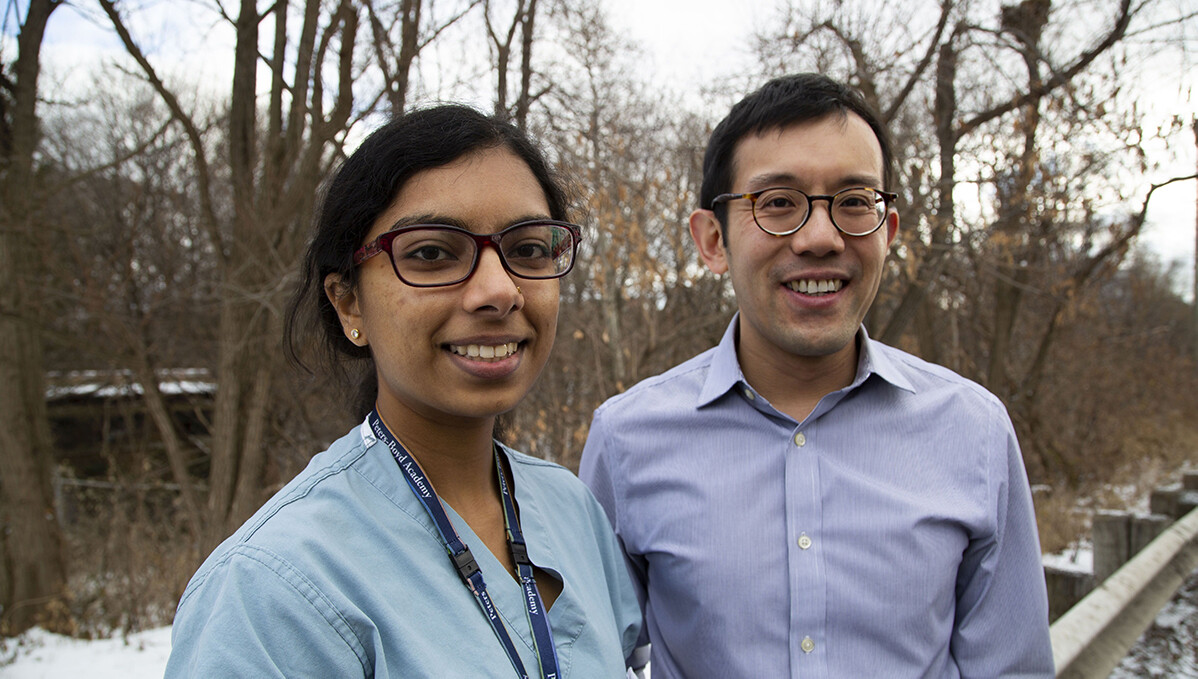Main Second Level Navigation
- Welcome
- Why Toronto?
- History of the Department
- Vision & Strategic Priorities
- Our Leadership
- Our Support Staff
- Location & Contact
- Departmental Committees
- Department of Medicine Prizes & Awards
- Department of Medicine Resident Awards
- Department of Medicine: Self-Study Report (2013 - 2018)
- Department of Medicine: Self-Study Report (2018 - 2023)
- Communication Resources
- News
- Events
Research Suggests Fragmented Sleep May Affect Brain’s Immune Cells, Impair Cognition

Gabrielle Giroday
 A new study by two University of Toronto researchers suggests that fragmented sleep in older people with and without Alzheimer’s disease may have an effect on the brain’s immune cells.
A new study by two University of Toronto researchers suggests that fragmented sleep in older people with and without Alzheimer’s disease may have an effect on the brain’s immune cells.
This could then impact people’s cognitive abilities, say researchers.
In a paper published in Science Advances, Dr. Andrew Lim, an associate professor in neurology at U of T’s Faculty of Medicine, and Kirusanthy Kaneshwaran, a third-year U of T medical student, studied microglia in the brains of older adults.
Microglia are described as the “brain’s innate immune cells” by Lim.
The study shows that in adults with fragmented sleep – where people were waking up repeatedly instead of sleeping soundly – there was an effect on microglia, and the cells showed signs of accelerated aging and other abnormalities.
The researchers were then able to identify that these changes in the microglia could be associated with worse cognition in older adults, both with and without Alzheimer’s disease.
“There are two important takeaways from this paper. One is that poor sleep is associated with brain immune dysregulation or dysfunction,” says Lim, the corresponding author for the paper.
“The second part is that dysfunction appears to be further associated with impaired cognition.”
The research in the paper supports “the hypothesis that poor sleep may lead to brain immune dysregulation,” says Lim, a scientist at the Hurvitz Brain Sciences Research Program at Sunnybrook Research Institute.
It also supports the idea that poor sleep may be a possible cause of cognitive decline and dementia.
“[G]reater expression of genes characteristic of aged microglia was associated with worse cognition and partially accounted for the association between sleep fragmentation and worse cognition,” says the paper.
“These findings raise the possibility that microglial aging and activation may be a consequence of sleep fragmentation and may link sleep fragmentation to poor cognition in older adults.”
It also points to other potential factors that lead to cognitive impairment.
“Our findings are compatible with three scenarios, microglial aging and activation may lead to sleep fragmentation, sleep fragmentation may lead to microglial aging and activation, or both may be caused by other brain changes, such as dementia-related brain pathologies,” says the paper.
The research was based on 685 adults who were more than 65 years old, including more than 260 who had Alzheimer’s disease.
The adults had been participants in the Rush Memory and Aging Project and Religious Orders Study.
For the study, researchers measured the participants’ sleep patterns using wearable devices. They also measured participants’ cognitive function on an annual basis.
Researchers quantified the number and state of brain’s innate immune cells of each participant by examining the gene expression patterns of the cells and by looking at the cells’ shape under the microscope.
“I have a relative with Alzheimer’s disease and I have always been fascinated about memory and what is the underlying mechanism of memory,” says Kaneshwaran, the first author of the study.
“Sleep is something that a lot of people have problems with. Losing your memory is something very deep, it’s like losing yourself as a person. I feel like it’s very important that if we can prevent that in any way, we do.”
The findings emphasize the importance of getting a good night’s rest, says Lim.
“Poor sleep is not something that should be ignored. It should be something that is taken seriously, and pursued,” he says.
“If you are sleeping poorly, you should bring it up with your doctor. If you need to, you can then can bring it up with a sleep specialist, and do the appropriate testing, and try to solve the problem. Improving sleep might potentially be a way of improving brain immune function, which may potentially improve cognition.”
There are promising research implications from the study, says Lim.
For example, further research may target brain immune dysregulation as a way of preventing unfavourable impacts on brain health for people with unavoidable sleep disruption, like for shift workers or airline workers.

